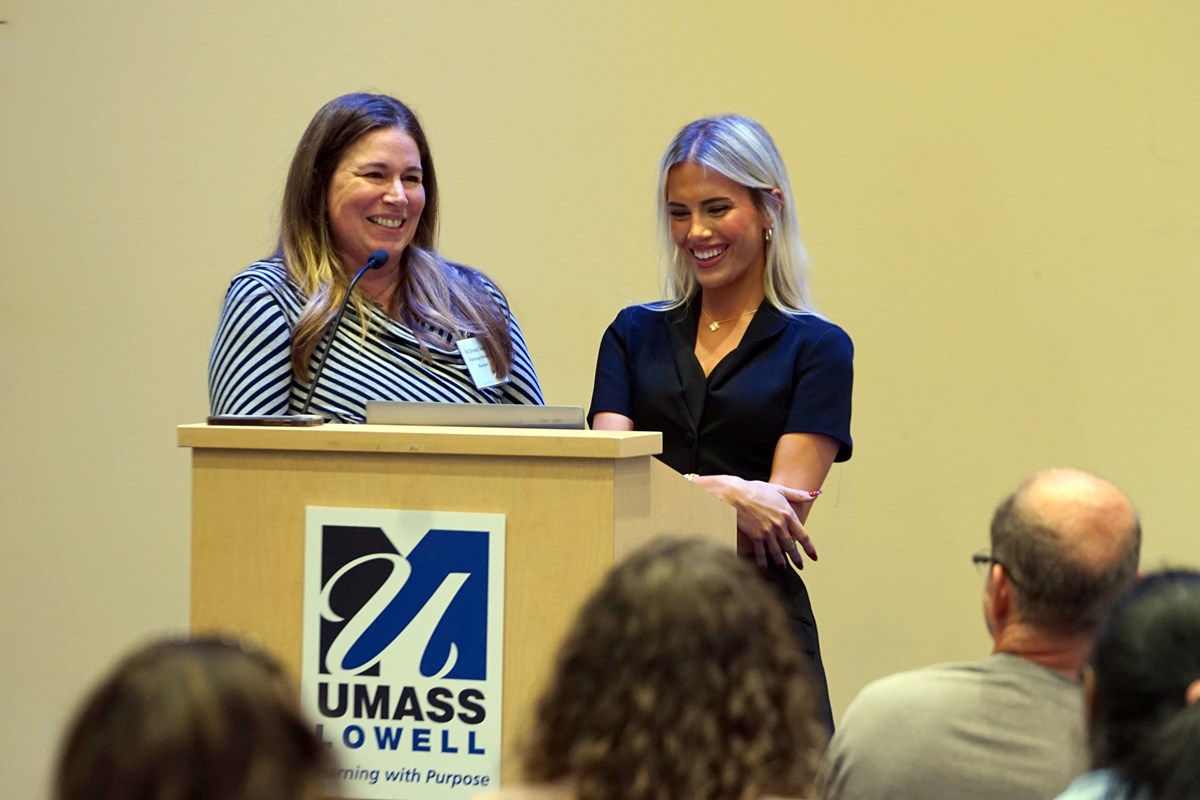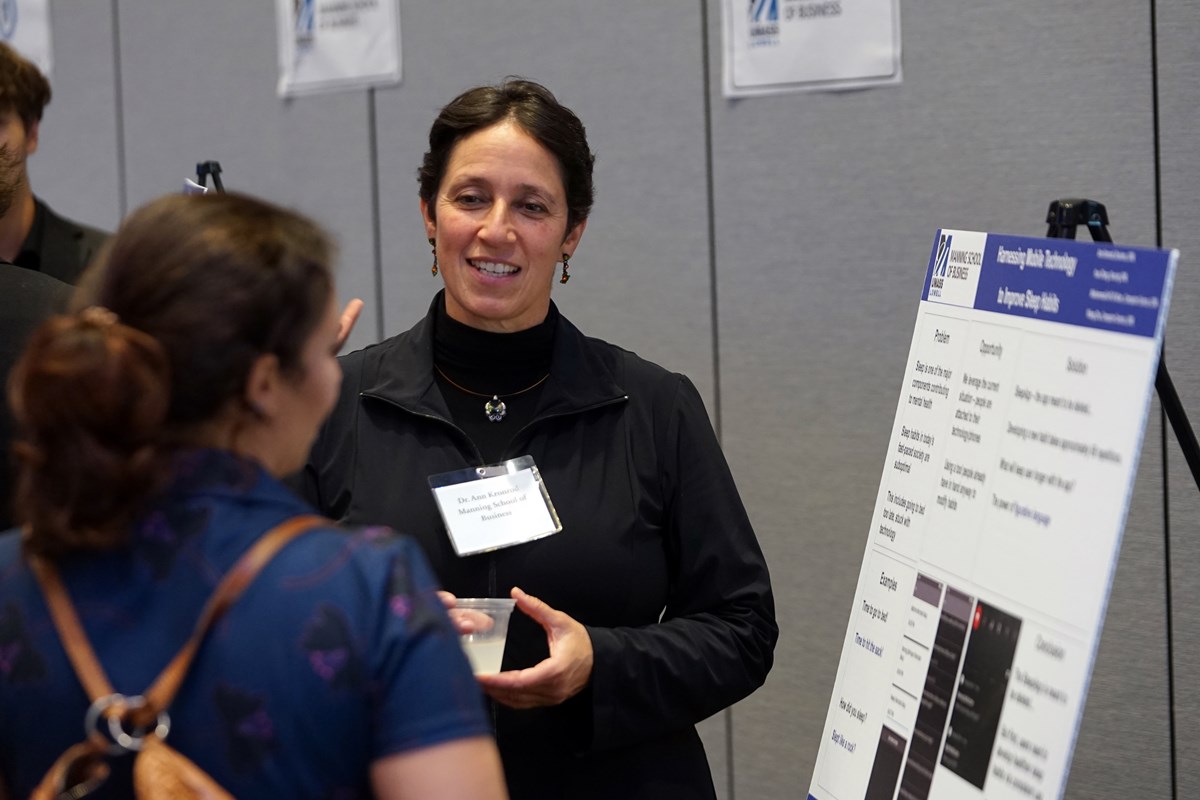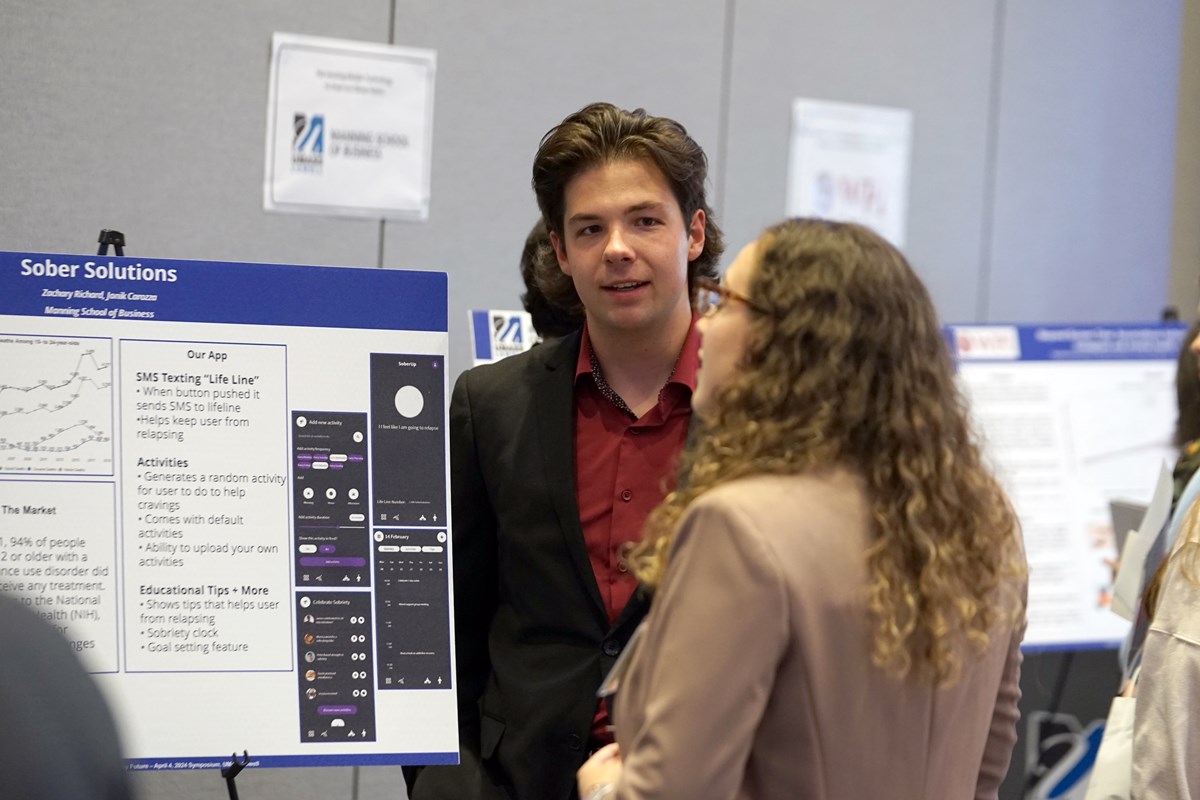 Image by Ed Brennen
Image by Ed Brennen
Computer science Ph.D. student Yidong Zhu shares his research work during the recent "Friend or Foe: Transforming Social Media & AI for a Healthy Future" symposium, hosted by the Manning School of Business and the Center for Accelerating Practices to End Suicide.
Whether it’s analyzing large amounts of data to identify risk factors for disease, monitoring patients remotely using wearable devices or improving communication with doctors through virtual assistants, artificial intelligence (AI) is already being used to improve health care.
But with transformative technology comes ethical concerns — and potential consequences for people’s mental well-being.
That was the focus of a recent interdisciplinary research symposium, “Friend or Foe: Transforming Social Media & AI for a Healthy Future,” co-hosted by the Manning School of Business and the Center for Accelerating Practices to End Suicide (CAPES).
“Technology is our friend, but sometimes it feels like it’s our foe. We have to try to balance the two, because we’re always going to be dealing with the impact,” said Assoc. Prof. of Marketing, Entrepreneurship and Innovation Denise Dunlap, who organized the event with Lani Faith Gacula, a Ph.D. student in entrepreneurship.
 Image by Ed Brennen
Image by Ed Brennen
Assoc. Prof. of Marketing Denise Dunlap, left, who organized the symposium, introduces keynote speaker Meghan Carroll, a social media professional who shared her experiences with the downsides of the technology.
That work, along with her role as business PI on the NIH-funded Center of Advancing Point of Care Technologies (CAPCaT), has made Dunlap “acutely aware of the need to bridge the gap between physical and mental health care in the digital health care space.”
The symposium featured a research showcase at University Crossing, where faculty experts, doctoral students and undergraduates from UML, UMass Chan Medical School and WPI shared their work in the fields of digital technology and mental health.
Cintya Gajardo Véjar, who is pursuing a Ph.D. in entrepreneurship at UML, is researching how people with attention-deficit/hyperactivity disorder (ADHD) are more susceptible to “time blindness” — and are less likely to manage their time on social media.
“It was surprising to see how many people felt represented by time blindness and told me the same thing happens to them,” said Gajardo Véjar, whose research poster “opened the conversation for other issues people had, like doomscrolling” — the act of consuming negative news online that makes you feel sad, anxious or angry.
 Image by Ed Brennen
Image by Ed Brennen
Assoc. Prof. of Marketing Ann Kronrod talks with a student about her research work on using figurative language to make people more engaged with sleep apps.
“There’s definitely good and bad implications of technology with mental health,” Richard said. “Social media today is really draining, but we’re trying to use it in a more positive and supportive way.”
Healthy sleeping habits can improve mental and physical health. According to a recent survey by the American Academy of Sleep Medicine, 35% of Americans have used an electronic sleep-tracking device to optimize the quality of their sleep.
Assoc. Prof. of Marketing Ann Kronrod is researching whether a sleep app that uses figurative language (for instance, telling a user “It’s time to hit the sack” instead of “It’s time to go to bed”) will be more successful.
“Lack of sleep can cause some really difficult mental problems, so the connection is absolutely vital,” said Kronrod, who is collaborating on the work with Yuan Zhang, an associate professor of nursing in the Zuckerberg College of Health Sciences. The project is supported by an interdisciplinary faculty research grant from the Donahue Center for Business Ethics & Social Responsibility.
 Image by Ed Brennen
Image by Ed Brennen
Sophomore business major Zachary Richards answers questions about Sober Solutions, an addiction recover app that he is developing with classmate John Carozza.
“Social media can make you feel like you’re so far behind, because you’re seeing everyone’s highlights and how successful they are,” said Carroll, who has worked with “hundreds” of companies to promote their goods and services online. “You have to be realistic with yourself and find things to ground yourself, like spending time with family.”
After struggling as a first-year student at the University of New Hampshire, Carroll took business classes online at UML before transferring to UMass Amherst. Assoc. Teaching Prof. of Marketing Deborah Casey had Carroll in one of her online classes and suggested to Dunlap that she speak at the symposium.
“I honestly think this type of event should be mandatory at schools,” Carroll said. “Hearing about other people’s experiences with social media and the downsides to it can be eye-opening.”
As a Ph.D. candidate in entrepreneurship, Gacula said the symposium epitomized how collaboration across fields can drive innovation.
“I hope students took away the need to openly address mental health struggles and break the stigma surrounding them,” she said.
